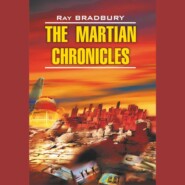По всем вопросам обращайтесь на: info@litportal.ru
(©) 2003-2024.
✖
Ray Bradbury Stories Volume 2
Настройки чтения
Размер шрифта
Высота строк
Поля
‘And here is a tiny ring I wore when I was eight,’ said Mrs Bentley. ‘It doesn’t fit my finger now. You look through it and see the Tower of Pisa ready to fall.’
‘Let’s see it lean!’ The girls passed it back and forth between them until Jane fitted it to her hand. ‘Why, it’s just my size!’ she exclaimed.
‘And the comb fits my head!’ gasped Alice.
Mrs Bentley produced some jackstones. ‘Here,’ she said. ‘I once played with these.’
She threw them. They made a constellation on the porch.
‘And here!’ In triumph she flashed her trump card, a postal picture of herself when she was seven years old, in a dress like a yellow butterfly, with her golden curls and blown blue-glass eyes and angelic pouting lips.
‘Who’s this little girl?’ asked Jane.
‘It’s me!’
The two girls held onto it.
‘But it doesn’t look like you,’ said Jane simply. ‘Anybody could get a picture like this, somewhere.’
They looked at her for a long moment.
‘Any more pictures, Mrs Bentley?’ asked Alice. ‘Of you, later? You got a picture of you at fifteen, and one at twenty, and one at forty and fifty?’
The girls chortled.
‘I don’t have to show you anything!’ said Mrs Bentley.
‘Then we don’t have to believe you,’ replied Jane.
‘But this picture proves I was young!’
‘That’s some other little girl, like us. You borrowed it.’
‘I was married!’
‘Where’s Mr Bentley?’
‘He’s been gone a long time. If he were here, he’d tell you how young and pretty I was when I was twenty-two.’
‘But he’s not here and he can’t tell, so what does that prove?’
‘I have a marriage certificate.’
‘You could have borrowed that, too. Only way I’ll believe you were ever young’—Jane shut her eyes to emphasize how sure she was of herself—‘is if you have someone say they saw you when you were ten.’
‘Thousands of people saw me but they’re dead, you little fool—or ill, in other towns. I don’t know a soul here, just moved here a few years ago, so no one saw me young.’
‘Well, there you are!’ Jane blinked at her companions. ‘Nobody saw her!’
‘Listen!’ Mrs Bentley seized the girl’s wrist. ‘You must take these things on faith. Someday you’ll be as old as I. People will say the same. “Oh, no,” they’ll say, “those vultures were never hummingbirds, those owls were never orioles, those parrots were never bluebirds!” One day you’ll be like me!’
‘No, we won’t!’ said the girls. ‘Will we?’ they asked one another.
‘Wait and see!’ said Mrs Bentley.
And to herself she thought, Oh, God, children are children, old women are old women, and nothing in between. They can’t imagine a change they can’t see.
‘Your mother,’ she said to Jane. ‘Haven’t you noticed, over the years, the change?’
‘No,’ said Jane. ‘She’s always the same.’
And that was true. You lived with people every day and they never altered a degree. It was only when people had been off on a long trip, for years, that they shocked you. And she felt like a woman who has been on a roaring black train for seventy-two years, landing at last upon the rail platform and everyone crying: ‘Helen Bentley, is that you?’
‘I guess we better go home,’ said Jane. ‘Thanks for the ring. It just fits me.’
‘Thanks for the comb. It’s fine.’
‘Thanks for the picture of the little girl.’
‘Come back – you can’t have those!’ Mrs Bentley shouted as they raced down the steps. ‘They’re mine!’
‘Don’t!’ said Tom, following the girls. ‘Give them back!’
‘No, she stole them! They belonged to some other little girl. She stole them. Thanks!’ cried Alice.
So no matter how she called after them, the girls were gone, like moths through darkness.
‘I’m sorry,’ said Tom, on the lawn, looking up at Mrs Bentley. He went away.
They took my ring and my comb and my picture, thought Mrs Bentley, trembling there on the steps. Oh, I’m empty, empty; it’s part of my life.
She lay awake for many hours into the night, among her trunks and trinkets. She glanced over at the neat stacks of materials and toys and opera plumes and said, aloud, ‘Does it really belong to me?’
Or was it the elaborate trick of an old lady convincing herself that she had a past? After all, once a time was over, it was done. You were always in the present. She may have been a girl once, but was not now. Her childhood was gone and nothing could fetch it back.
A night wind blew in the room. The white curtain fluttered against a dark cane, which had leaned against the wall near the other bric-a-brac for many years. The cane trembled and fell out into a patch of moonlight, with a soft thud. Its gold ferrule glittered. It was her husband’s opera cane. It seemed as if he were pointing it at her, as he often had, using his soft, sad, reasonable voice when they, upon rare occasions, disagreed.
‘Those children are right,’ he would have said. ‘They stole nothing from you, my dear. These things don’t belong to you here, you now. They belonged to her, that other you, so long ago.’
Oh, thought Mrs Bentley. And then, as though an ancient phonograph record had been set hissing under a steel needle, she remembered a conversation she had once had with Mr Bentley – Mr Bentley, so prim, a pink carnation in his whisk-broomed lapel, saying, ‘My dear, you never will understand time, will you? You’re always trying to be the things you were, instead of the person you are tonight. Why do you save those ticket stubs and theater programs? They’ll only hurt you later. Throw them away, my dear.’
But Mrs Bentley had stubbornly kept them.
‘It won’t work,’ Mr Bentley continued, sipping his tea. ‘No matter how hard you try to be what you once were you can only be what you are here and now. Time hypnotizes. When you’re nine, you think you’ve always been nine years old and will always be. When you’re thirty, it seems you’ve always been balanced there on that bright rim of middle life. And then when you turn seventy, you are always and forever seventy. You’re in the present, you’re trapped in a young now or an old now, but there is no other now to be seen.’
It had been one of the few, but gentle, disputes of their quiet marriage. He had never approved of her bric-a-brackery. ‘Be what you are, bury what you are not,’ he had said. ‘Ticket stubs are trickery. Saving things is a magic trick, with mirrors.’
If he were alive tonight, what would he say?

















